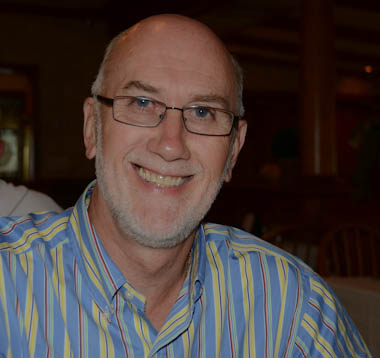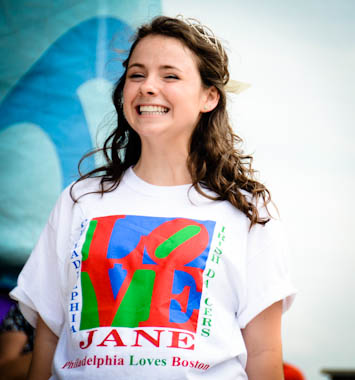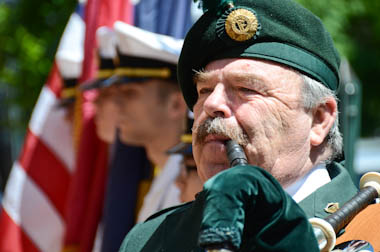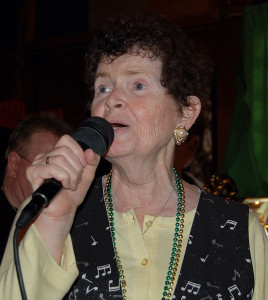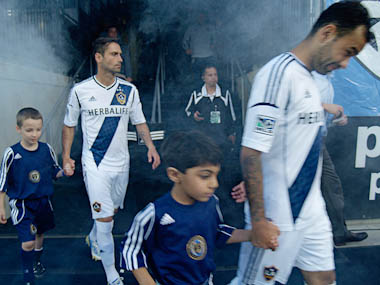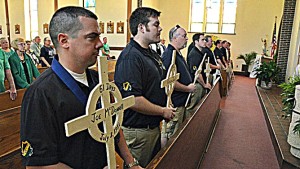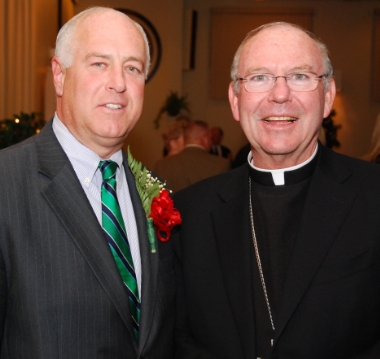
Michael Bradley and Bishop Joseph McFadden
The night before he died, Bishop Joseph McFadden was talking to a friend about the Holy Thursday homily of Pope Francis, the one in which he encouraged priests to go “out of” themselves, to put their hearts and souls “on the line,” to reach out to their flocks like good shepherds, “shepherds living with the odor of sheep.”
At his funeral this week in Harrisburg, where the 65-year-old native Philadelphian headed the central Pennsylvania diocese, it was clear that he had long ago taken that message as his own personal mission. “He had only been in Harrisburg for three years and everybody in Harrisburg felt that they’d lost a family member,” said Bishop McFadden’s sister, Sister Jane McFadden, IHM, vice principal of St. Francis DeSales School in Philadelphia.
“That was Joe. If there was a sick person, someone who needed to be baptized or confirmed, he would go to the farthest end of the diocese, where people hadn’t seen bishops for years. He’d walk into the high school and when he’d see a group of kids he’d just say, “Hey, how are you? What are you doing?” He was there so much the principal gave him a key to the building! At his funeral, someone said, he never had an acquaintance, he had a friend.”
He had many friends—3,000 of them on Facebook alone. One of them was Philadelphia labor leader John Dougherty, business manager of the International Brotherhood of Electrical Workers Local 98, who had dinner with the bishop the night before he died of a massive heart attack on May 2. McFadden had been in the city attending a meeting of the Catholic Bishops of Pennsylvania.
“I know that people said he was a regular guy, but he wasn’t a regular guy he was a special guy,” said Dougherty. “When we were having dinner, he was telling me stories from Harrisburg, about how an Albanian gentleman had come to the rectory because he had plumbing problems and he helped him with them. Then the man came back with all the papers involving a mortgage problem because Bishop McFadden had helped him with his plumbing! That’s the kind of guy he was. He officiated at my mother’s funeral a few years ago. And as recently as a week ago he came to our scholarship dinner even though he had to postpone some confirmations. He told me, ‘I wouldn’t miss it.’”
As extraordinary as he was, he was also a “regular Joe,” says Michael Bradley, Philadelphia’s St. Patrick’s Day parade director who called Bishop McFadden “my best friend.”
“He used to come to my house at the shore and we would go fishing,” recalled Bradley. “He had an old t-shirt on with a hole in it, a crappy hat—he looked like a guy on vacation with his family. He was fun to be with and loved being with his family. ”
And he had a uncanny way with the fish. “He’d catch all the fish and I didn’t catch any!’ laughed Bradley. “We switched rods once and I still didn’t catch any. He had already caught 15 and he caught three more!”
But his real love was golf. “It was church first, family second, and golf third,” laughs his sister. “Basketball had to be fourth.”
It was basketball and a family tragedy that kept Joseph McFadden from, as his sister put it, “doing what he supposed to do:” become a priest, which he didn’t do till he was in his 30s. “My mother used to say at the dinner table, ‘It would be wonderful to have a priest.,’ It’s every Irish mother’s dream. And we always thought he would be. He was always at church. . .even in high school he served Mass and that was unusual at that time.”
When Bishop McFadden was 18, his mother died suddenly of a massive heart attack. His older brother was in the service and his sister, Jane, who was a year older (“we were Irish twins”), a novice. “I think if my mother hadn’t died he might have gone into the seminary after high school. But he felt like he had to stay home with our younger sister, Ellen, and my Dad.” Two years later their father died of cancer, so Joe, then in college, had even more reason not to enter the priesthood—he had to look after Ellen.
He also had a drive to be a teacher—and basketball coach. After graduating from St. Joseph University with a degree in political science, he toyed briefly with the idea of entering St. Charles Borromeo Seminary, then decide to apply to West Catholic High School, his eye on coaching the basketball team. (He had played varsity basketball at St. Thomas More High School and was on the freshman basketball team at St. Joseph’s.) But to be able to coach, he had to teach and the only job that was open was teaching general science. He took it. After a year, he gradually moved into National Problems—close to his major—and then, religion. Eventually he became director of athletics.
A visit to his sister Jane’s mission in Peru was a turning point—the poverty he witnessed made him begin to think about where he was going with his life. “It was after my sister, Ellen, married and he almost won a basketball championship he finally did what he was supposed to do,” said Sister Jane. He entered St. Charles in 1976 when he was 29, older than most of his classmates, graduating magna cum laude a few years later with a master of divinity degree.
After spending several years as secretary to the late Cardinal John Krol, McFadden was appointed first president of Cardinal O’Hara High School in Springfield, Delaware County, where there will be a Mass of Memorial on Wednesday, May 15, at 6:30 PM. (The high school is at 1701 S. Sproul Road in Springfield.) That’s where he and Michael Bradley first met. Bishop McFadden served as chaplain to the St. Patrick’s Day Parade for many years and was still listed as its chaplain emeritus.
“We became good friends back in the 80s, though, when he became bishop, we became even closer,” recalled Bradley. “We talked every week and we were supposed to get together soon. We were talking about taking a trip to Ireland in the fall. I don’t cry too much, but I cried when I heard he had died. He had that quality of looking at you when you were talking so that everybody thought he was their best friend. Well, he was mine. I feel like I lost my own father.”
He left many who knew him feeling the same way. He was the kind of man—gregarious. genuinely kind, and down-to-earth—who earned “a seat in first class on his way to heaven,” said John Dougherty. “But,” he added, “knowing Joe, he was no doubt sitting in the back with the rest of the people.”

